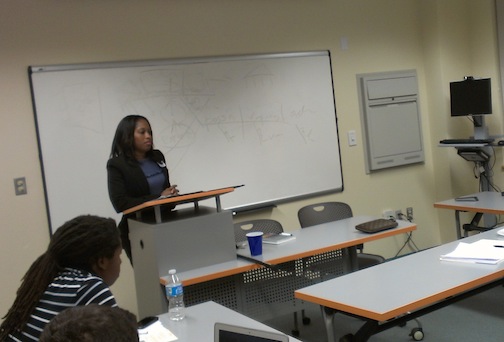Above: attorney Niyala Harrison (CJ Photo)
By Alexander Britell
MIAMI — The legacy of Marcus Garvey remains just as relevant to the modern day, particularly to the Caribbean.
That was among the findings of the Fifth Marcus Garvey Seminar held Thursday night at the University of Miami School of Law.
The seminar, chaired by attorney David Rowe, a law professor at the University of Miami School of Law, looked at Garvey’s history and impact throughout the region and the United States — from the story of the Black Star Line to the relevance of Garvey’s economic theories to the McDuffie Riots in 1980s Miami.
The first Marcus Garvey Seminar was held in 1999, with later sessions in 2000, 2001, 2003.
“I think Garvey stands for the empowerment of black people,” Rowe said. “He specifically stands for the empowerment of Jamaican black people, which has still not yet been achieved. However, Jamaican people now realize Garvey’s importance, and are struggling for economic independence.”
This year’s seminar was conducted in part by members of Rowe’s course on the law of the Commonwealth Caribbean.
“I think his legacy is really important for young black people to carry on,” said attorney Niyala Harrison, the keynote speaker at the seminar and an adjunct professor at Miami-Dade College. “It’s about respect, redemption of one’s self, self-reliance, doing work for your community, I think those are the lasting ways we can embody Garvey’s ideas.”
For the wider region, Garvey’s philosophy remains important to the spirit of the post-colonial movement, according to Harrison.
“A lot of the countries of the region, for the most part, have kind of moved away from colonial rule,” she said. “I think Jamaica will be one of the last stalwarts holding on to the Queen, but I think a move towards complete political independence is what he would have wanted.”
